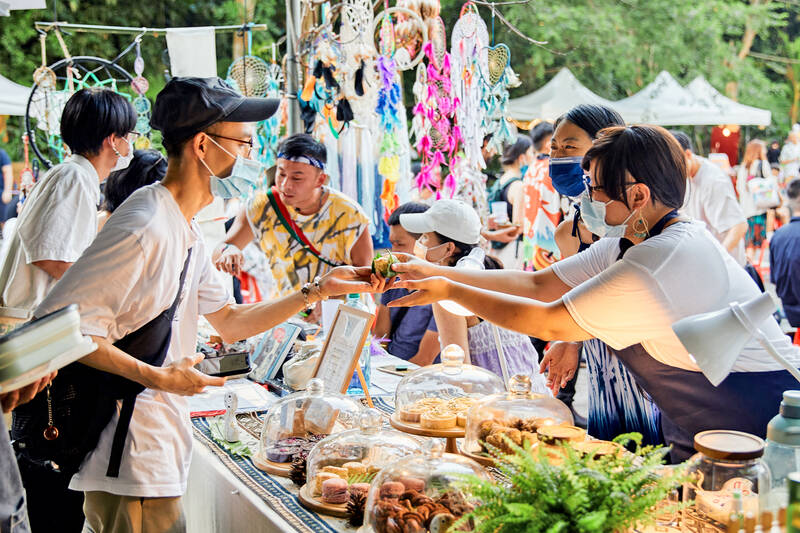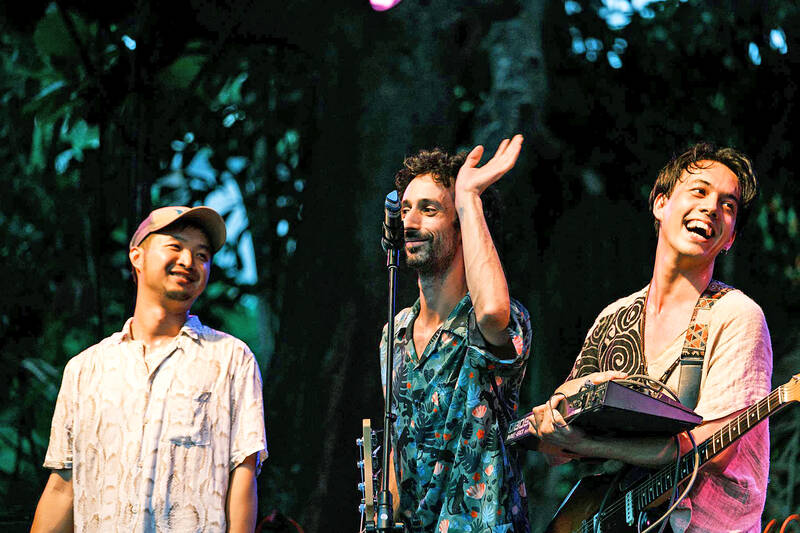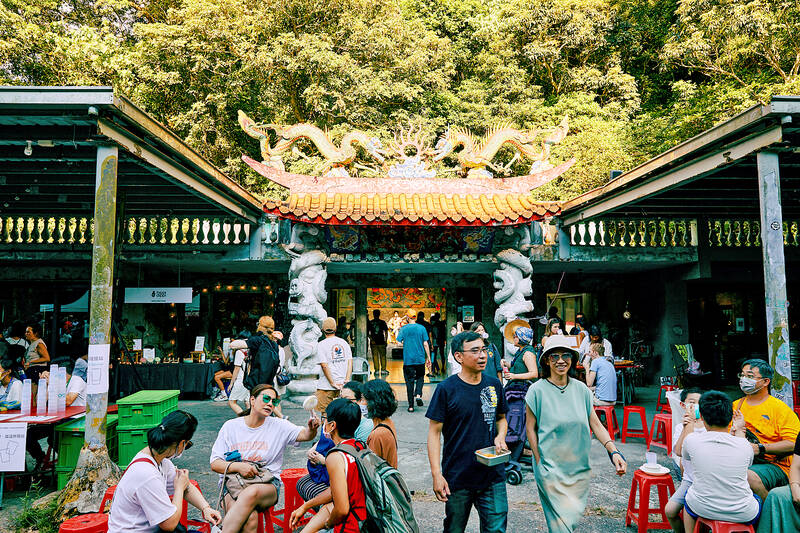Lillygol Sedaghat is bringing both her experience with Taiwan’s circular economy and breakdancing scene to this year’s Taipei Veggie Fest (台北素食生活節).
After exploring Taiwan’s waste management system, plastics recycling program and circular economy initiatives in 2017 and 2018, the National Geographic digital storyteller returned last year to further delve into the nation’s progress in repurposing waste material and sustainability.
Taking place on Saturday on Earth Day, the festival features vegan/vegetarian food, eco-friendly vendors, more than 100 musicians playing on three stages, lectures, art and yoga. Organizer Sean Scanlan says that after proving that a meat-free event was viable, the focus now is on reducing waste.

Photo courtesy of Taipei Veggie Fest
“Many say ‘Music is Life,’ but there’s actually more to ‘life’ such as our impact on the Earth, what we consume and what we throw away,” he says.
As usual, single-use tableware is not allowed so you’ll want to bring your own containers and utensils. There will be rental cups on site. Sedaghat and her partner Cory Howell are bolstering the theme by inviting local circular-economy designers they’ve met to participate in the event. For example, the stage design will be 3D printed with materials developed by National Cheng Kung University using reservoir silt and other waste.
The festival is also partnering with meat substitute companies such as OmniFoods and Lypid, which makes PhytoFat, an oil encapsulation technology that makes plant-based meat substitutes tastier.

Photo courtesy of Taipei Veggie Fest
In addition, both Sedaghat and Howell are experienced breakdancers, and they’re adding a hip-hop vibe to the Veggie Fest this year by featuring dance teacher and DJ Lin Chang-hao (林昌豪) as well as other dancers from the underground scene.
VISUALIZING CIRCULARITY

Photo courtesy of Taipei Veggie Fest
Growing up in San Diego, Sedaghat was a huge fan of Taiwanese milk tea. But it was only after she graduated college that she started wondering where the plastic waste went and how her habit impacted the environment. Eventually, this notion culminated in her arriving in Taiwan on a Fullbright-National Geographic Award grant.
Sedaghat says that while Taiwan has done an excellent job with the circular economy on the industry and policy levels, there’s still a huge disconnect when it comes to people integrating it to their everyday lives. In fact, a lot of locals she spoke to were not aware of the progress that was being made. So far, much of the effort toward the public is through the consumer lens — such as bringing their own shopping bags and cups — but that has its limits.
“If you really want to transform society, you need to have a vision that people can see themselves contributing to,” she says. “The notion of how we embrace our relationship to the planet isn’t something we talk about a lot. It’s such an abstract thing; so how can we produce it through music, food, community and activities?”

Photo courtesy of Taipei Veggie Fest
Visualizing circularity and the relationship between the environment and culture has been Sedaghat’s goal as a National Geographic storyteller for the past seven years. For this project, she hopes to highlight various ventures in Taiwan, such as a diaper company that has found a way to reuse 99 percent of diaper waste, factories that capture emitted steam and repurpose it and an academic who has been tirelessly promoting a reservoir silt-based material as a sustainable means of solving wall mold.
“Let me show you through photos, videos, multimedia and infographics how this works, how we can take it to the next step … and the people trying to change things.”
Sedaghat has noticed significant changes since her last stint in Taiwan. Nobody wanted recycled diapers five years ago, for example, but as they refined the technology and countries began setting sustainability goals that were coded into law, the market demand changed too.
“Before, the market was all price-based; it was cheaper to make something from a resource rather than recycling. Now people want that material because it has a story,” she says.
As many Taiwanese manufacturers produce for global brands, they’ve responded to this shift by taking the initiative to adapt and explore ways to achieve that within their processes.
“Giving a face to those people is important because we often give voices to brands, but the hidden supply chain is important too,” she says.

Following the rollercoaster ride of 2025, next year is already shaping up to be dramatic. The ongoing constitutional crises and the nine-in-one local elections are already dominating the landscape. The constitutional crises are the ones to lose sleep over. Though much business is still being conducted, crucial items such as next year’s budget, civil servant pensions and the proposed eight-year NT$1.25 trillion (approx US$40 billion) special defense budget are still being contested. There are, however, two glimmers of hope. One is that the legally contested move by five of the eight grand justices on the Constitutional Court’s ad hoc move

Stepping off the busy through-road at Yongan Market Station, lights flashing, horns honking, I turn down a small side street and into the warm embrace of my favorite hole-in-the-wall gem, the Hoi An Banh Mi shop (越南會安麵包), red flags and yellow lanterns waving outside. “Little sister, we were wondering where you’ve been, we haven’t seen you in ages!” the owners call out with a smile. It’s been seven days. The restaurant is run by Huang Jin-chuan (黃錦泉), who is married to a local, and her little sister Eva, who helps out on weekends, having also moved to New Taipei

The Directorate-General of Budget, Accounting and Statistics (DGBAS) told legislators last week that because the Chinese Nationalist Party (KMT) and Taiwan People’s Party (TPP) are continuing to block next year’s budget from passing, the nation could lose 1.5 percent of its GDP growth next year. According to the DGBAS report, officials presented to the legislature, the 2026 budget proposal includes NT$299.2 billion in funding for new projects and funding increases for various government functions. This funding only becomes available when the legislature approves it. The DGBAS estimates that every NT$10 billion in government money not spent shaves 0.05 percent off

Dec. 29 to Jan. 4 Like the Taoist Baode Temple (保德宮) featured in last week’s column, there’s little at first glance to suggest that Taipei’s Independence Presbyterian Church in Xinbeitou (自立長老會新北投教會) has Indigenous roots. One hint is a small sign on the facade reading “Ketagalan Presbyterian Mission Association” — Ketagalan being an collective term for the Pingpu (plains Indigenous) groups who once inhabited much of northern Taiwan. Inside, a display on the back wall introduces the congregation’s founder Pan Shui-tu (潘水土), a member of the Pingpu settlement of Kipatauw, and provides information about the Ketagalan and their early involvement with Christianity. Most